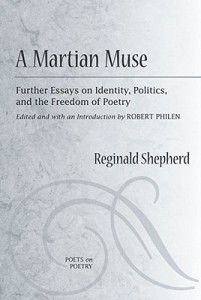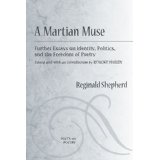 A Martian Muse: Further Essays on Identity, Politics, and the Freedom of Poetry (Poets on Poetry)
A Martian Muse: Further Essays on Identity, Politics, and the Freedom of Poetry (Poets on Poetry)
by Reginald Shepherd
Edited and with an introduction by Robert Philen
University of Michigan Press. 208 pages, $60. (paper, $21.95)
AWARD-WINNING POET, anthologist, and critic Reginald Shepherd died from cancer almost two years ago, in the early fall of 2008. He was 45. Earlier that year, Shepherd had celebrated the publication of his book of essays Orpheus in the Bronx, which was named a finalist for a prestigious National Book Critics Circle award a few months after his death. Fortunately, Shepherd left behind work for a second collection, which has been edited by his partner Robert Philen and published as A Martian Muse: Further Essays on Identity, Politics and the Freedom of Poetry. The book continues and amplifies the crucial themes and ideas begun in Shepherd’s first book, and the two volumes together showcase a mind brilliantly suited to critiquing contemporary poetry and identity politics.
Shepherd’s writing isn’t prescriptive, pedantic, or theoretical. It’s the opposite, in fact; it’s meant to be read, used, embraced, and lived. Philen says in his poignant but astute introduction: “The essays in A Martian Muse, reflecting the broad-ranging nature of Shepherd’s mind, explore the big issues of any consideration of poetry, How poetry works, and How poetry is written or comes to be, though with each essay characterized by the precision and specificity that are a hallmark of his poetry and prose.” Shepherd manages to write a prose that is rigorous and complex as well as accessible, even intimate, sometimes in the same essay.
A Martian Muse contains 25 of Shepherd’s final essays, ranging across several categories, with titles that include “Poetics and Poetry,” “Art and Society,” “Artistic Production,” “Intention, Aspiration, Inspiration,” and “Illness, Identity, and Poetry.” This last section (in which, full disclosure, this reviewer is briefly mentioned) contains the collection’s most moving essays, often written “in the moment” of Shepherd’s most painful and frightening struggles with cancer and its complications. Even as his optimism and resilience are apparent in these essays, Shepherd is clearly working through, often eloquently, how a writer envisions his own mortality, how he understands a body that seems to be its own worst enemy. As might be expected, it is in these essays that Shepherd discusses his “relationship” with HIV, something that he admits had not been “a major presence in my poetry.” (For an exception to this, see Shepherd’s poem “Antibody” in Wrong.)
Other individual essays look at “difficulty” in poetry, the art of the long poem, “progressive art,” teaching creative writing, and poets like Wilfred Owen, Paul Celan, John Ashbery, and Tim Dlugos. If Theodor Adorno was the first book’s major influence (Adorno is here too), this book’s major influence can be seen in the collection’s title, where Shepherd pays homage to a fellow gay poet who also died too young, Jack Spicer, and Spicer’s concept of “Taking Dictation from a Martian Muse,” the title of one of the most interesting essays in the book, and one that’s important for understanding Shepherd’s project as both a poet and critic. Here and elsewhere, Shepherd discusses (and praises) Spicer’s notion of poetry as dictation and the poet’s role as a radio receiving transmissions. Shepherd saw in Spicer a poet who could open up new possibilities for poets, those who had “renounced their intelligence” and those who listened more closely to their egos than the poem’s needs. He writes, “Part of the point of Spicer’s poetics is that everything comes from the outside; there’s no romantic interiority generating poems in the sensitive soul. This is a useful corrective to the fetishization of personal creativity, proposing instead what Robin Blaser calls the practice of outside.”
Philen’s touching tribute to Shepherd, his partner of almost a decade, offers up a thoughtful, lovingly rendered frame for the essays. In the introduction’s most moving section, Philen shares a hard-to-decipher poetic fragment that Shepherd wrote during his hospitalization a few weeks before he died. The fragment, written amidst intense hallucinations that Shepherd was experiencing, is haunting—even more so as Philen shapes the strange, disembodied lines into a powerful poem that joins the simplicity of beauty with a profound understanding of mortality. Philen uses the fragment and how it seemed “dictated” to Shepherd from some outside force to discuss Shepherd’s genius as well as to introduce many of the themes explored in the book.
Shepherd’s writing is tough, smart, and often provoking—insistent on asking the hard questions. But Shepherd’s work is perhaps even more successful because he never shied away from sharing his own personal experiences of negotiating the sometimes thorny intersections of art and life. In both his poetry and his essay collections, he talks about how living as a black gay man, being HIV-positive, and growing up poor informed his outlook on literature, criticism, reading, and his own writing of poetry. He deftly connects his own need to confront a complex identity to larger concerns facing contemporary writers. This second collection solidifies Shepherd’s reputation as one of the most cogent, provocative commentators on identity and art. While he will be terribly missed, this collection gives us a little more of the shining intellect and hard-won humanity that Shepherd shared throughout his distinguished but too-short career.
Christopher Hennessy is the author of Outside the Lines: Talking with Contemporary Gay Poets.






